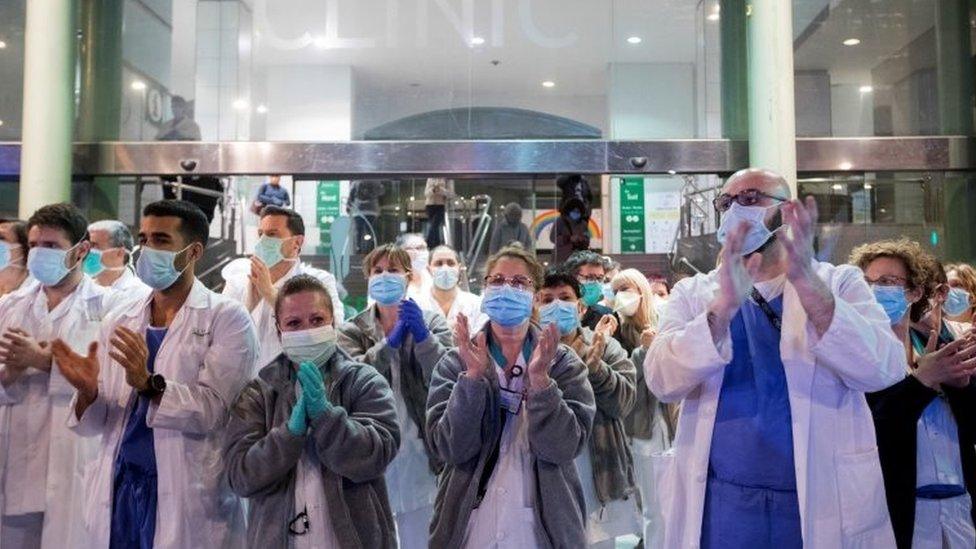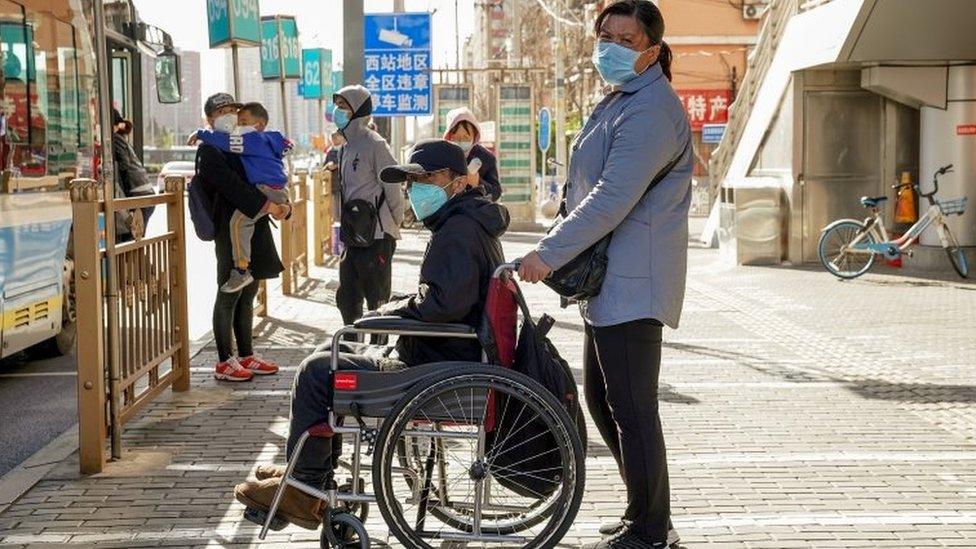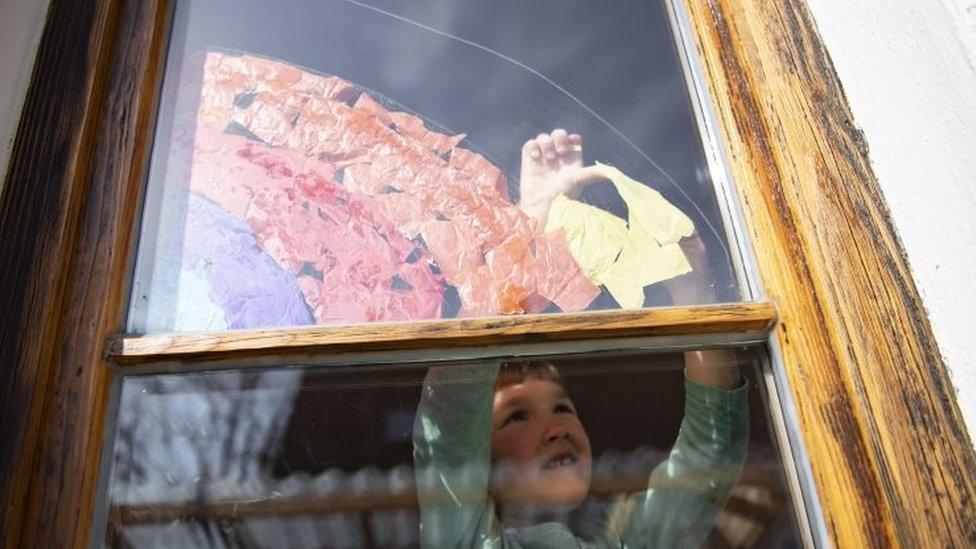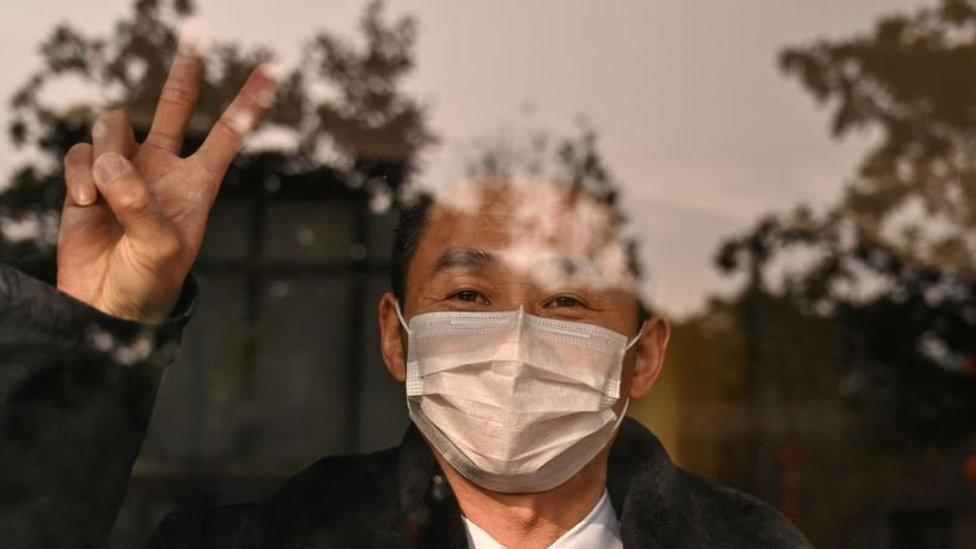Coronavirus: From clapping to kindness, five reasons to be hopeful
- Published

Clapping events have become a common way to salute healthcare workers fighting the pandemic
As the number of coronavirus cases continue to rise worldwide, positivity is hard to come by. We are in the throes of a global health crisis that may last weeks, if not months.
And yet there are plenty of reasons to be cheerful. As the pandemic has deepened, the worst of the crisis has brought out the best out in humanity.
1. Healthcare workers are being applauded worldwide.
Doctors, nurses and other healthcare workers have been on the front line of the fight against the coronavirus.
Of the more than 500,000 people infected by the virus globally, around 130,000 have recovered, according to data collated by Johns Hopkins University, external. Those recoveries can be attributed, in part, to the heroic efforts of healthcare workers.
To acknowledge this, people across the world, including Italy and Spain, France and India, have taken part in poignant clapping tributes to salute them. The latest example happened in the UK on Thursday, when people went to their doorsteps and windows to take part in a collective round of applause.
UK applauds health workers fighting the coronavirus
The trend of public cheering started in mid-January in the Chinese city of Wuhan, where the first cases of coronavirus emerged. Video clips on Chinese social media showed residents shouting encouragement and singing songs from their apartment windows at night, in an effort to boost each other's morale.
As coronavirus spread beyond Wuhan, so too did outpourings of gratitude. Clapping has gone global.
2. China is relaxing restrictions.
For the time being, at least, China appears to believe it has brought its coronavirus emergency under control. Very few home-grown - known as locally transmitted - cases have been reported in recent days. Most of its new cases have been imported from aboard.
That means the Chinese government is beginning to ease some of the restrictions it imposed to stem the spread of the virus.

Restrictions on travel have been lifted in parts of China, restoring a sense of normality
On 25 March, China's Hubei province lifted travel restrictions on people leaving the region. The lockdown in Wuhan, which began in January, is scheduled to be eased on 8 April.
As BBC China correspondent Stephen McDonell reported, people in the Chinese capital, Beijing, have been able to breathe fresh air - and probably a sigh of relief - too.
Stephen McDonell met people in Beijing heading out after the lockdown
As restrictions are lifted, there are fears of a second wave of infections in China. But for now, China is taking tentative steps towards restoring normality.
3. Italy might be turning the tide.
Coronavirus: Italians sing from their windows to boost morale
Earlier this week, Italy's Civil Protection Agency said the country was in "an apparent stabilisation phase" of contagion. That's because for four consecutive days, the country reported a decline in the number of new cases and deaths from coronavirus.
On Wednesday, the daily number of new cases was 3,612, a lower number than for the four previous days. Infections rose on Thursday, and it was a mixed picture on Friday, with a lower number of new infections than Thursday, but the biggest rise in deaths so far.
Those four days of decline, albeit brief, were seen as a glimmer of hope in Italy, which is the worst-hit country in Europe.
The World Health Organization (WHO) has called the slowdown encouraging. The health chief in Lombardy, the hardest-hit region, said there was "light at the end of the tunnel".

A SIMPLE GUIDE: What are the symptoms?
AVOIDING CONTACT: Should I self-isolate?
VIDEO: The 20-second hand wash

4. Scientific progress continues.
The world is relying on scientists to develop a vaccine so that people do not become sick if they are exposed to the virus.
Several vaccines are in development, with human trials already under way. Realistically, experts say a vaccine won't be ready for at least a year to 18 months.
But as scientists race to develop one, more and more is being discovered about the virus.
Inside the US laboratory developing a coronavirus vaccine
This week, for example, there have been reports of promising research about the genetic code of the virus, external. Viruses produce mutations as they replicate inside the cells of different hosts, but in the case of this coronavirus (SARS-CoV-2), scientists have observed few mutations.
If that's the case, it could mean that a single vaccine would give someone immunity for a long time.
"A virus with a stable genome is good news for vaccine development," said virology professor Stefano Menzo, who is studying the virus.
5. Community spirit and acts of kindness are flourishing.

Children have been putting rainbows in windows to show their optimism
Although coronavirus has been keeping people apart, communities have been coming together in their time of need. All over the world, acts of kindness and solidarity have raised spirits.
In the UK, hundreds of thousands of people have signed up to join the NHS's volunteer army, smashing the government's recruitment target. Stephen Powis, NHS England medical director, said there had been "outbreaks of altruism" and he was "bowled over" by the response from volunteers.
In Spain, a doctor's online plea for letters to those who had been hospitalised by coronavirus received an overwhelming response. Tens of thousands of letters were sent by well-wishers, El Pais reported, external.
And to connect with each other, people have been putting images of rainbows in their windows and on their balconies, in a colourful sign of optimism.
- Published21 March 2020

- Published27 March 2020

- Published24 March 2020

- Published6 October 2021
